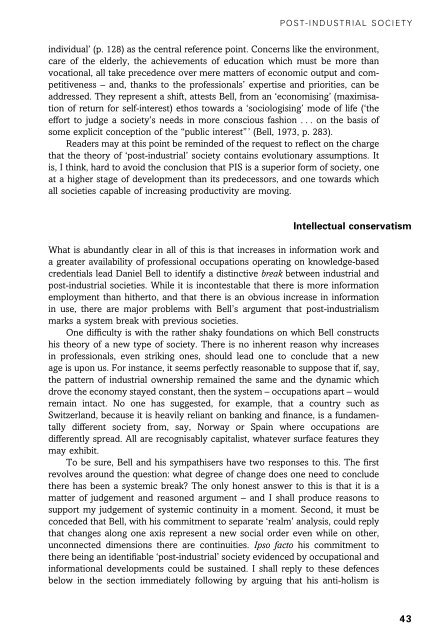Theories of the Information Society, Third Edition - Cryptome
Theories of the Information Society, Third Edition - Cryptome
Theories of the Information Society, Third Edition - Cryptome
Create successful ePaper yourself
Turn your PDF publications into a flip-book with our unique Google optimized e-Paper software.
POST-INDUSTRIAL SOCIETY<br />
1<br />
1<br />
individual’ (p. 128) as <strong>the</strong> central reference point. Concerns like <strong>the</strong> environment,<br />
care <strong>of</strong> <strong>the</strong> elderly, <strong>the</strong> achievements <strong>of</strong> education which must be more than<br />
vocational, all take precedence over mere matters <strong>of</strong> economic output and competitiveness<br />
– and, thanks to <strong>the</strong> pr<strong>of</strong>essionals’ expertise and priorities, can be<br />
addressed. They represent a shift, attests Bell, from an ‘economising’ (maximisation<br />
<strong>of</strong> return for self-interest) ethos towards a ‘sociologising’ mode <strong>of</strong> life (‘<strong>the</strong><br />
effort to judge a society’s needs in more conscious fashion . . . on <strong>the</strong> basis <strong>of</strong><br />
some explicit conception <strong>of</strong> <strong>the</strong> “public interest”’ (Bell, 1973, p. 283).<br />
Readers may at this point be reminded <strong>of</strong> <strong>the</strong> request to reflect on <strong>the</strong> charge<br />
that <strong>the</strong> <strong>the</strong>ory <strong>of</strong> ‘post-industrial’ society contains evolutionary assumptions. It<br />
is, I think, hard to avoid <strong>the</strong> conclusion that PIS is a superior form <strong>of</strong> society, one<br />
at a higher stage <strong>of</strong> development than its predecessors, and one towards which<br />
all societies capable <strong>of</strong> increasing productivity are moving.<br />
Intellectual conservatism<br />
1<br />
2<br />
1<br />
1<br />
What is abundantly clear in all <strong>of</strong> this is that increases in information work and<br />
a greater availability <strong>of</strong> pr<strong>of</strong>essional occupations operating on knowledge-based<br />
credentials lead Daniel Bell to identify a distinctive break between industrial and<br />
post-industrial societies. While it is incontestable that <strong>the</strong>re is more information<br />
employment than hi<strong>the</strong>rto, and that <strong>the</strong>re is an obvious increase in information<br />
in use, <strong>the</strong>re are major problems with Bell’s argument that post-industrialism<br />
marks a system break with previous societies.<br />
One difficulty is with <strong>the</strong> ra<strong>the</strong>r shaky foundations on which Bell constructs<br />
his <strong>the</strong>ory <strong>of</strong> a new type <strong>of</strong> society. There is no inherent reason why increases<br />
in pr<strong>of</strong>essionals, even striking ones, should lead one to conclude that a new<br />
age is upon us. For instance, it seems perfectly reasonable to suppose that if, say,<br />
<strong>the</strong> pattern <strong>of</strong> industrial ownership remained <strong>the</strong> same and <strong>the</strong> dynamic which<br />
drove <strong>the</strong> economy stayed constant, <strong>the</strong>n <strong>the</strong> system – occupations apart – would<br />
remain intact. No one has suggested, for example, that a country such as<br />
Switzerland, because it is heavily reliant on banking and finance, is a fundamentally<br />
different society from, say, Norway or Spain where occupations are<br />
differently spread. All are recognisably capitalist, whatever surface features <strong>the</strong>y<br />
may exhibit.<br />
To be sure, Bell and his sympathisers have two responses to this. The first<br />
revolves around <strong>the</strong> question: what degree <strong>of</strong> change does one need to conclude<br />
<strong>the</strong>re has been a systemic break? The only honest answer to this is that it is a<br />
matter <strong>of</strong> judgement and reasoned argument – and I shall produce reasons to<br />
support my judgement <strong>of</strong> systemic continuity in a moment. Second, it must be<br />
conceded that Bell, with his commitment to separate ‘realm’ analysis, could reply<br />
that changes along one axis represent a new social order even while on o<strong>the</strong>r,<br />
unconnected dimensions <strong>the</strong>re are continuities. Ipso facto his commitment to<br />
<strong>the</strong>re being an identifiable ‘post-industrial’ society evidenced by occupational and<br />
informational developments could be sustained. I shall reply to <strong>the</strong>se defences<br />
below in <strong>the</strong> section immediately following by arguing that his anti-holism is<br />
43
















